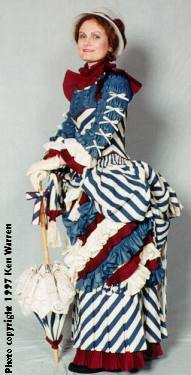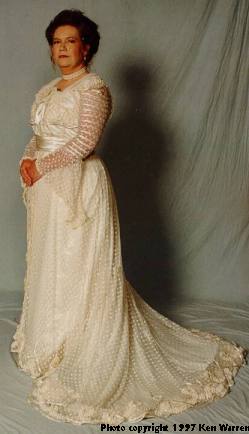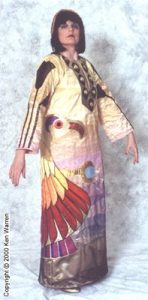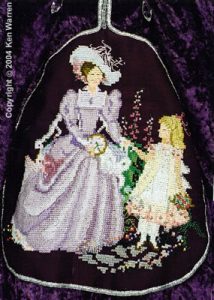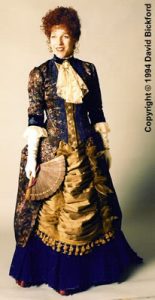CC15-H-20: Curtain Call
CC15-H-20: Curtain Call | Division: Journeyman | Category: Hist. Reproduction | Designer(s): Cat Devereaux‡ and Jennifer Balue-Harnsberger | Maker(s): Cat Devereaux‡ and Jennifer Balue-Harnsberger | Presenter(s): Katherine Jepson | Presentation Award(s): Best in Class | Documentation Award(s): Best Documentation | Additional Award(s): Also won a Tricorn and Mob Cap from CC17, a copy of the Threads book Distinctive Details and a subion to Costume and Dressmaker Magazine (Photo ID: Ken Warren #10-28 | Event Date: 1997)
Competition Staff & Rules
Staff:
- Director: Sue Schroeder
- Master of Ceremonies: Gordon Rose
- Presentation Judges: Mike Tartaglio, Kathleen Norvell & Rob Himmelsbach
- Judge’s Clerk: Warren Mayer
Rules:
Rules: These general rules applied to both the Science Fiction & Fantasy and the Historical Masquerades:
* Costumes which have been purchased or rented are not eligible to compete.
* Costumes previously worn in the halls at CCXV also are ineligible to compete.
* Each person may appear only once on stage per masquerade. If you have more than one costume to enter, please find more than one person to wear them.
* No non-human creatures will be allowed backstage or on-stage with the exception of guide/aid dogs needed by a contestant.
* No messes! Do not leave glitter, powder, liquid, debris, or anything else on the stage that cannot be scooped up in the dark in a few seconds by the stage ninjas. Please be careful with stage makeup, stage blood, etc. to make sure it does not rub off on casual contact and endanger other people’s costumes.
* No fire! This includes flash paper/cotton/powder, explosions, and open flame of any kind.
* No electricity! There will be no electrical outlets for contestants; costumes should be self-powering.
* No audio! Likewise, there will be no microphone on stage for contestants — any script should be taped or typed out for the MC to read.
* No flagrant nudity — please keep displays of skin to a PG rating or less.
* Surprise the audience. Surprise the judges. But do not surprise the Masquerade Director. Please warn the Director if you are planning any surprise effects.
The Masquerade Directors reserve the right to remove anyone from competition for any of the following: violation of the above rules; concern for the safety of the audience, crew, and other contestants; or for any other reason deemed sufficient.
The Historical Masquerade was held Sunday night. Unlike the SF&F Masquerade, each entry in the Historical Masquerade was judged in all five of these categories:
* Documentation
* Authenticity
* Complexity
* Workmanship
* Presentation
Documentation Review
The first step in judging the Historical Costume Competition is a review of the documentation supplied. The documentation is written like a research paper, complete with foot notes and a bibliography. Photocopies (or originals) of pictures are acceptable within the documentation, however they must be legible. The contestants may include fabric swatches and do other things to make their documentation more appealing, however, they may *not* include photocopies of the text of books from which the research has been performed. The Historical judges review the documentation Friday through Sunday.
Pre-judging
The next step in judging consists of a review of the workmanship, authenticity, and complexity of the garments. The judges have 10 minutes to view each contestant. The judges look at all parts of the costume, including underpinnings and seams. Although some contestants prefer to wear their costumes to the pre-judging, they are subject to prodding, poking, lifted skirts, and other (similar) indignities. Shy contestants are advised to bring (not wear) their costumes to the pre-judging.
Presentation
The last step in judging the competition is during the Historical Masquerade. Contestant have one minute (60 seconds) to present their costumes on stage. It is not necessary that all this time be used; this is a theoretical limit. Additional time is granted on a case-by-case basis. Entries that extend over the limit are penalized. Entries that extend 30 seconds over the limit are disqualified.
There are two costume categories: Recreation and Interpretation.
The Recreation category is for all entries which are attempting to re-create an actual garment. Documentation should show pictures of the original.
The Interpretation category is for all other entries. This category is for costumes which would have been possible, given the locale and time; for costumes which would not have been possible due to differences in locale or time; and, for modern theatrical pieces. The documentation standards for Interpretation are no less strict than for Recreation. Only the intent of the costume is different.
The following ranking system applies: Novice, Journeyman, Master. A contestant’s ranking in the Science Fiction & Fantasy masquerade does not affect his or her ranking in the Historical Masquerade. However, the standards for determining ranking will be the same as in the SF&F masquerade.
Miscellaneous Notes:
Prizes donated by: Lark Books (Magazine Subscription), Classic Trims, Taunton Press (Threads), Costume & Dressmaker Magazine, Freedom Arts & Manufacturing, and Castle Blood.
Statistics:
22 total entries; 1 Junior, 11 Novices, 5 Journeymen, 5 Masters; 17 Interpretation and 6 Re-Creation.
